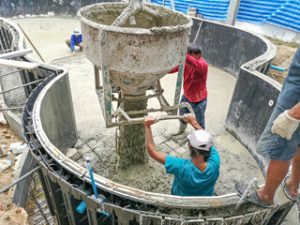When it comes to Custom Pool Builders The Woodlands experience and expertise are essential. Choosing a reputable professional ensures that your project will be handled properly and will adhere to local regulations.

The construction process is complex and requires the expertise of a skilled team. The right builder will be able to handle all aspects of the project and create your dream pool.
Expert pool builders are trained to understand your vision and translate it into a design that will complement your home’s architectural style. Using the latest innovations in water purification and heating technology, they create a swimming pool that is safe for swimming and relaxing while also minimizing energy costs. They can even integrate your new pool with existing garden elements, creating a seamless aesthetic flow.
Many people attempt to save money by working on their own backyard projects without hiring an expert. This often leads to costly mistakes, especially when it comes to building a pool. It is important to hire a professional custom pool builder with years of experience. They will be able to provide valuable insights into the construction process and address any problems that may arise along the way.
A well-designed and constructed pool is a luxurious feature that can transform your backyard into a private oasis. A pool can also be a social space for entertaining guests, and the right finishing touches like poolside bars are a great addition. Experienced custom pool builders can collaborate with you to personalize the design and layout of your poolscape. They can help you select unique features such as infinity edges, lap pools for fitness enthusiasts, or family-friendly designs with shallow areas and built-in seating. They can also advise you on the best location for your pool based on local safety standards and regulations.
When choosing a professional custom pool builder, look for a builder with extensive experience designing and constructing unique projects. They should be able to demonstrate their expertise by providing a portfolio of past work and references from previous clients. Online customer reviews and testimonials are another useful tool to evaluate the quality of a builder’s craftsmanship and customer satisfaction levels.
You should choose a builder who is licensed and insured, as this ensures that they adhere to industry standards and are covered in the event of any accidents or other unforeseen circumstances during the project. They should also be able to provide you with an estimated timeline for your project’s completion. It is also important to choose a builder that prioritizes clear communication throughout the project, keeping you updated and answering any questions promptly.
Experience
When choosing a custom pool builder, it’s important to look for one who can deliver on their promises. They should be experienced and offer a wide range of services to help you achieve your dream pool. A good builder will have a great portfolio of past projects and references from clients. They should also be licensed by the state and have liability insurance. You should also ask the pool builder about their warranty options.
A pool construction project entails several specialized tasks from excavation to plumbing and electrical installation. Licensed custom pool builders have the experience to manage these tasks efficiently and effectively, saving you time and money. They can also advise you on the best design features to complement your home and meet your lifestyle needs.
During your initial consultation, an experienced custom pool builder will take a detailed look at your backyard and assess your vision and preferences. They will recommend the right shape and location of your pool, taking into account factors such as sun exposure, potential debris, privacy, and other considerations. They will be able to suggest a number of different styles for your pool, ranging from sleek, modern designs to natural, free-form pools that accentuate your backyard’s unique contours.
When constructing your pool, an experienced custom builder will use only the highest quality materials to ensure it is long-lasting and dependable. They will also follow strict safety standards to ensure a safe environment for you and your family. They will keep you updated throughout the construction process and address any questions or concerns promptly.
A well-designed backyard swimming pool is just the beginning. An expert custom pool builder will be able to go above and beyond by adding other elements to your landscape, from luxurious spas to stylish outdoor kitchens. They will also work with you to adorn your poolscape with the perfect finishing touches to create a private oasis, a fun social space, or any other environment that fits your household’s lifestyle.
Financing
Many people assume a pool is an expensive investment, but it does not have to be. Most custom pool builders offer financing options to help make the project affordable for homeowners. Some lenders specialize in financing pools, while others provide general home improvement loans. Regardless of the lender you choose, it is important to compare interest rates and repayment terms before making any decisions.
Financing is available through banks, credit unions, online lenders and peer-to-peer providers. Most of these loans are unsecured, which means you do not have to put up any collateral. Most also have lower minimum requirements than other loan types, which can make them more accessible for homeowners who might not have sufficient home equity or a high enough credit score to qualify for a mortgage. Some lenders will allow you to pre-qualify online to see if you might have a good chance of approval.
In addition to securing financing, you should also consider the cost of site preparation and permits, which can affect the overall project budget. It is important to get a detailed quote from your custom pool builder so you know exactly what costs are associated with the pool construction and ongoing maintenance.
If you are working with a reputable pool builder, they will have partnerships with lending institutions that understand the unique nature of the project and can work to provide flexible financing solutions for their clients. For example, the pool builder may have a relationship with Lyon Financial or HFS financial, which can facilitate funding throughout the entire project.
Other financing options that might be available through your pool builder include using a personal credit card. These are often able to offer 0% interest for a specific period, which can be helpful for those who want to finance only a portion of their swimming pool project. However, the high interest rates after the introductory period can mean this option is not ideal for large expenses like a new pool.
While a backyard pool can be a significant investment, it can increase the value of your home and make it an enjoyable space for families to relax and spend time together. Choosing the right custom pool builder for your project will ensure that you are happy with the results and can enjoy your pool for years to come.
Design
A well-designed custom pool elevates your backyard into a private oasis for relaxing, entertaining, and exercise. A professional builder will understand your vision and design a pool that meets your functional needs while reflecting your personal aesthetic.
To gauge a builder’s capabilities and style, review their portfolio of completed projects. Then, discuss their approach to the project at hand and determine whether their vision aligns with your own. During the consultation process, pay attention to how they respond to your questions and concerns, as this is a direct reflection of their professionalism and attentiveness.
Once you’ve narrowed down your options, ask for quotes from each prospective builder and compare details. Examine the cost of materials, labor, and any additional features you desire. Ensure that the final estimates are within your budget and ask about financing options, as these can help offset initial costs and reduce the strain on your wallet.
A reputable custom pool builder will have no problem providing references from previous clients. These are a great way to assess a builder’s professionalism and workmanship, as well as their customer satisfaction levels. Online reviews are also a valuable source of feedback from past clients, so take the time to read these before making your decision.
Inquire about the builder’s certification, licensing, and insurance. This will help you verify that they operate legally and adhere to industry standards, ensuring the quality of their work. Additionally, a reputable company will provide you with a comprehensive warranty to protect your investment.
A custom pool is an impressive addition to any property, boosting its value and elevating your outdoor living space. A skilled custom pool builder will use state-of-the-art tools and years of experience to design, construct, and install your dream swimming pool. They will also use high-quality materials to ensure your pool is aesthetically pleasing and long-lasting. They will also incorporate smart pool technology to maximize your convenience and allow you to control features with the push of a button. This way, you can easily turn on the lights or adjust the water temperature, and enjoy a fully customized swimming experience.


